Last year I started anointing a Jazz Artist of the Year after a spurt of six Ivo Perelman albums that would have dominated my best-of list if not set apart. I've done it again because once again there was an artist so prolific AND so good that he was again worth noting separately. Though pianist Matthew Shipp only released one album as a leader in 2013, he was a prolific collaborator, especially with Perelman. And it has been many years since Shipp was a 'sideman'; he is an equal on these projects.
Taking well-deserved primacy here, of course, is his one new 2013 album under his own name (there was also Greatest Hits, reviewed by Dusty Wright here), though several of those listed below it are of equal quality.
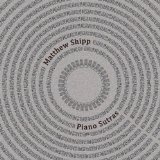
Matthew Shipp: Piano Sutras (Thirsty Ear)
After my review of this great, great solo piano album was published, I worried that people might take my comparison to Mal Waldron the wrong way. Shipp has not copied Waldron here. I just wanted to wax ecstatic about the love we share for Waldron's inimitable style, and express that with so few pianists following in Waldron's footsteps, I'm happy to hear someone taking that style further. Shipp is nothing if not original and distinctive; part of what makes him so is having a different set of influences -- musical DNA, so to speak -- from the usual ones. At times on Piano Sutras I hear an evolution of Waldron DNA, mixed in with much more.
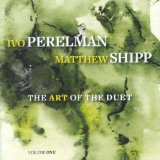
Ivo Perelman/Matthew Shipp: The Art of the Duet Vol. 1 (Leo)
Of the five (!) 2013 albums on which Shipp teams with Brazilian saxophonist Ivo Perelman, this is the one on which Shipp's equality with the leader is most patently obvious. Note the Vol. 1 designation; this is the first of a promised three Perelman/Shipp duo albums. Since their previous duo outing in 1996, both have expanded and deepened their art. This sounds to me more refined and abstract than before, or for that matter than their other albums this year. The tracks are all relatively short -- no extended blowing here, instead highly concentrated free-improvisation etudes focusing, in the moment, on particular aspects, whether timbre, counterpoint, organic development, etc. The tight focus and frequently intellectual bent of these tracks (not that there are not impassioned passages) belies the clichéd stereotype of free improvisation, but there are also some fiery moments, most notably the final moments of "Duet #04." Often they seem to be concentrating most on timbre, and they sure do have a multitude of them on here. Of course, Perelman's ax is more conducive to extravagant displays of timbral variety, but Shipp's pretty adept at switching up his tone/touch as well. In the rarified realm of jazz duo albums, this ranks high.

Ivo Perelman/Matthew Shipp/Michael Bisio/Whit Dickey: The Edge (Leo)
This album finds Perelman working with Shipp's regular trio. Once again the tracks are all relatively concise; there are even three under two minutes. Textures are varied, most drastically on "Fatal Thorns," a sax-drums duet, and "Interlude," just sax and piano. Free jazz saxophonists used to avoid using pianists, but Shipp's style never impinges on their freedom even as it improvises the blueprint of the structure over his rhythm section's foundation. Perelman is sonically at the forefront but Shipp's trio's shaping of the tracks seems to generally set the agenda for Perelman's fluidly creative improvisations. It is bassist Michael Bisio, sawing away raucously, who is heard first here on opening track "Clarinblasen," but it is the booming chords (built on fourths) of Shipp that define the track's sound. The roiling "Lancaster" finds Perelman flitting above the busy skittering of Bisio and drummer Whit Dickey as Shipp, often settling in a tonal area and pounding away at it, complements the shapes Perelman sketches. Perelman does take the lead more actively on the aptly named "Volcanic," whereon he erupts in a frenzy of intense improvisation that is the climax of the album, after which the less-retro-than-its-title-suggests "Websterisms" lovingly brings the album to a gentle close.
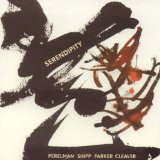
Here is a glorious anomaly, in several ways. It was supposed to be Perelman, Shipp, and Cleaver, but somebody was late, Parker was called, and then both showed up to make it a quartet. Parker, in case you don't know, is the supreme free-jazz bassist of the present era, so that was serendipity indeed. Shipp and Parker were half of the mighty David S. Ware Quartet for several decades, in addition to much other work together, so their interaction has been honed to affine point. Cleaver is a more muscular drummer than Dickey, Parker a bassist of heftier conception and tone than any, and Serendipity is a single 43-minute improvisation of singular density and impact, with Perelman is at his most Ayleresque (or maybe Frank Wright is a better comparison). That's not to say that the textures aren't varied, that the density doesn't ebb and flow; when things quiet down (after coming to an impressive boil) around the 15-minute mark, and Perelman takes a breather for a bit, it turns into a nearly post-bop passage with Shipp at the forefront spinning serpentine lines that coil and writhe restlessly as Parker and Cleaver shadow his every move, his every rhythmic twitch, for three minutes; then Perelman rejoins, Shipp drops out, and the saxophonist waxes balladic, but with an edgy uneasiness, like Johnny Hodges continually spinning around to see if someone's following him. When Shipp comes back in, there's an almost dance-like passage, sort of an updated bar-walking groove refracted through the prism of free jazz. And then, of course, it mutates, because that's what these guys do: always take it somewhere else, always move ahead, twist the sound into a new permutation -- but always organically. It doesn't always work; there's a stretch of several minutes starting around 28:20 that's a little too treading-water for my tastes, no matter how hip Cleaver's beat becomes eventually. It's Shipp who pulls them out of that dead end with several long stretches of big, chiming chords to change up the texture and snap them out of it. Afterward, Perelman goes into a virtuoso display of altissimo stabs alternating with bass honks that (with Shipp laying out) gets into another great groove with Parker and Cleaver. (If Wynton says this doesn't swing, he's deaf.) One brief and minor lapse aside, though, this is an inspired and invigorating session that's everything great about free jazz blowing sessions.

Ivo Perelman/Matthew Shipp/Whit Dickey/Gerald Cleaver: Enigma (Leo)
This session is distinguished by no bassist but two drummers. Besides the inherent interest in the interaction of the two drummers, whose styles are so different but who complement each other superbly here, this lineup also gives the piano an even more pivotal role in the sound of the music overall. I'm not going into this one in great detail; aside from the points just noted, its strengths are quite similar to those of the Perelman/Shipp/Bisio/Dickey album. I do slightly prefer the clarity of sound this lineup offers, though, and of course the greater rhythmic energy is especially compelling.
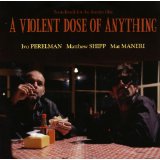
Ivo Perelman/Matthew Shipp/Mat Maneri: A Violent Dose of Anything (Leo)
In his booklet notes for this music created for the soundtrack to a Brazilian film, writer Neil Tesser makes much of the supposed surprise of free jazz being used for a soundtrack. After the seminal example of New York Eye and Ear Control (ESP-Disk, 1965), featuring Perelman inspiration Albert Ayler, it doesn't seem surprising to me (Les Stances a Sophie [Nessa, 1970] by the Art Ensemble of Chicago is also worth a citation here, though it's not as directly analogous.) This is, to the best of my knowledge, the first time microtonal violist Mat Maneri has appeared on a Perelman album, but Maneri and Shipp are long-time collaborators in many contexts. Among the reasons Perelman cites for having wanted to work with Maneri are his interaction with his saxophonist father, Joe Maneri; a desire to use strings; and his horn-like phrasing ("it breathes"). One also imagines the thinner textures this group produces in their free improvisations are also more easily matched to narrative without overwhelming it. Not having seen the movie, I hear it as pure music, and it is entirely successful on that primal level; the interaction between Maneri and Perelman, in particular, is stunningly beautiful (given a listener's acclimation to atonal free improvisation, of course). Shipp's more delicate playing offers a most interesting alternative to his usual approaches. Consistently ighter in tone and more mercurial in development than most of Perelman's or Shipp's music, this eight-movement suite is unique in his voluminous discography.
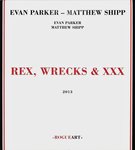 Evan Parker/Matthew Shipp: Rex, Wrecks & XXX (RogueArt)
Evan Parker/Matthew Shipp: Rex, Wrecks & XXX (RogueArt)
Last but certainly not least, this two-disc set is Shipp's second duo album with the great English saxophonist Evan Parker (I have not yet heard their previous outing together, Abbey Road Duos (Treader, 2007). A partial explanation of the album title: There are three types of tracks here, Rex (six studio duos), Wrecks (one studio solo for each player), and XXX (an epic 41-minute duo concert performance). Though both are free players, Parker has a much different style from Perelman, cooler and more abstract. Shipp, who has some of that in his own style, makes an apt partner, and generally leaves more space here than he does with Perelman. (When Shipp has an outburst in the concert where he pounds away on one chord/cluster for a while, Parker follows him rhythmically but not dynamically or emotively.)

Matthew Shipp: Greatest Hits (Thirsty Ear)
For those not previously hip to the defining jazz pianist of his generation, here's a well-programmed chance to catch up. Granted, the twelve tracks on this compilation are drawn only from his work as a leader on this label, so missing are his integral contributions to the mighty David S. Ware Quartet, and the fruitful collaborations with saxophonists Rob Brown and Ivo Perelman over the decades. In fact, we only hear recordings from 2000 on (though the inclusion of "Circular Temple #1" does, in composition at least, look back to the beginning of his career). But there's so much variety to be heard here, from solo piano musings to coolly funky fusions of electronics and hip-hop beats with jazz to post-bop to freewheeling avant-jazz groups that showcase the high-keyed interactions that perhaps most inspire him and definitely show him in the context in which he made his mark. However, the biggest revelation here, and seemingly the guiding concept of the programming here, is just how good a composer Shipp is. Obviously none of these tracks are really "hits," but within the context of his (so to speak) mature output, these are the pieces that are most built to last, and could appeal most readily to non-jazzbos, but without any sense of compromised values. Which is WHY he's the defining jazz pianist of his generation.
My examination of my favorite non-Shipp jazz releases of 2013 will follow shortly.
